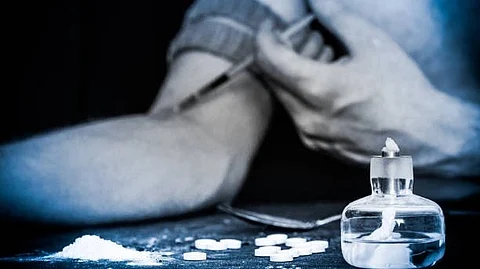

Drug abuse has grown to be a global issue and the number one killer. The condition of drug addiction, also known as substance use disorder, affects the brain and behavior of a person and causes them to lose control over their choice of drugs or medications.
Individuals who inject drugs (psychoactive substances used for non-medical purposes) are more likely to get hepatitis B, C, and HIV. Millions of deaths and new cases of HIV each year are caused by the global epidemic of addiction and drug usage.
Other effects of drug misuse in the family include a cost on the economy, a dysfunctional family atmosphere, violence, and psychological issues.
In recent years, drug addiction has been on the rise in India. In India, alcohol is the substance that is most frequently used, followed by drugs like nicotine, opioids, and cannabis.
In India, most cannabis users are found in Uttar Pradesh, followed by Punjab, Sikkim, Chhattisgarh, and Delhi.
As per the report submitted in the year 2022, the Ministry of Social Justice and Empowerment with the National Drug Dependence Treatment Centre of All India Institute of Medical Sciences performed a survey to determine the frequency of drug usage in India.
Indian Government Initiative:
The Indian government is working continuously and in sync to address the issue of youth addictions as follows:
To raise awareness about drug addiction and protect children, the Narcotics Control Bureau collaborated with the Ministry of Social Justice & Empowerment and the National Council for Protection of Child Rights
Nasha Mukt Bharat Abhiyaan (NMBA) has been launched in 272 of the most vulnerable districts on August 15, 2020, to address the issue of drug abuse among young people in India and it has already reached more than 3.3 crore young people
Establishing addiction treatment centers in government hospitals and implementing Outreach and Drop-In Centers
More than 300 Drug Abuse Motivational Counseling Facilities
Awareness raising and life skill training community-based Peer-Led Intervention centers established
Self-Care Techniques for Controlling Addiction:
Some elements are referred to as protective elements because they lower the danger of substance abuse and foster healthy growth. The following self-care techniques are beneficial for people with substance use disorders:
Follow a healthy diet
Regular exercise
Maintain a healthy sleep routine.
Build up your social network.
Learn healthy strategies to cope with stress and unpleasant feelings
The Way Forward
More understanding among individuals, families, and societies regarding the use of proper public health measures can help prevent the health and social issues related to the use and dependence on nicotine, alcohol, and illegal substances.
The best treatment approaches for a long-term recovery focus on each patient's drug use history and physical, mental, and social issues.
Children's learning about drugs and how to avoid using them and becoming addicted to them is the responsibility of parents, schools, and healthcare workers.
It is necessary to implement drug misuse prevention programs at schools, colleges, housing cooperatives, family clinics, and hospitals.
